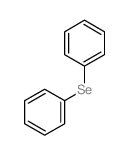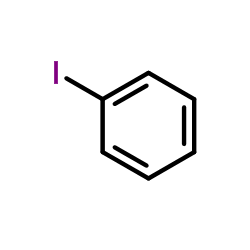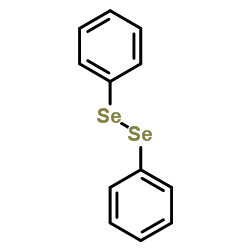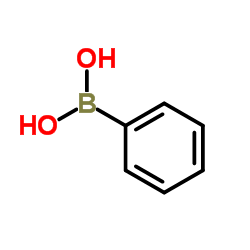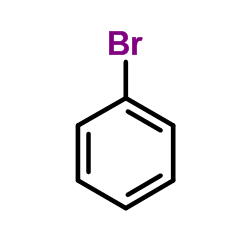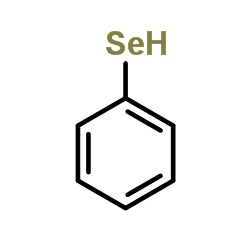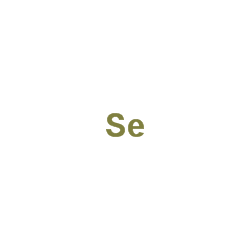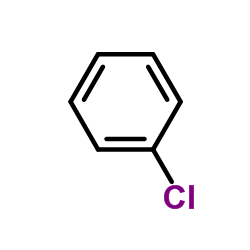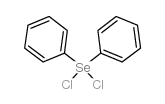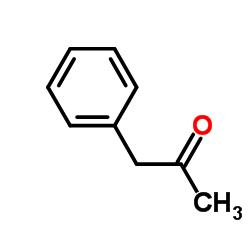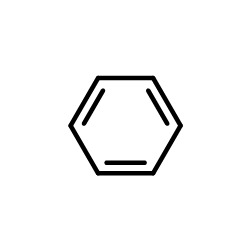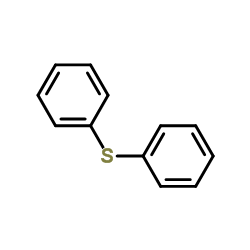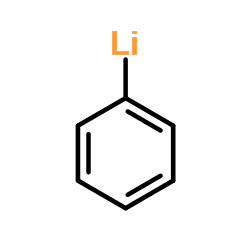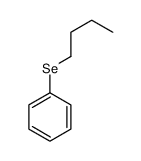1132-39-4
| 中文名 | 二苯硒醚 |
|---|---|
| 英文名 | phenylselanylbenzene |
| 中文别名 |
二苯基硒醚
二苯硒 |
| 英文别名 |
Diphenyl selenide
PHENYL SELENIDE Biphenyl selenide Selenide,phenyl Biphenyl selenium 1,1'-Selenobisbenzene Benzene,1,1'-selenobis Diphenyl selenium MFCD00014067 EINECS 214-474-3 |
| 密度 | 1.338 g/mL at 25ºC(lit.) |
|---|---|
| 沸点 | 115-117ºC(lit.) |
| 熔点 | 3ºC |
| 分子式 | C12H10Se |
| 分子量 | 233.16800 |
| 闪点 | >230 °F |
| 精确质量 | 233.99500 |
| LogP | 1.34160 |
| 蒸汽压 | 0.00188mmHg at 25°C |
| 折射率 | n20/D 1.6465(lit.) |
| 储存条件 | 保持贮藏器密封、储存在阴凉、干燥的地方,确保工作间有良好的通风或排气装置 |
| 稳定性 | 如果遵照规格使用和储存则不会分解,未有已知危险反应,避免氧化物、空气、水分/潮湿 |
| 分子结构 | 1、摩尔折射率:无可用的 2、摩尔体积(cm3/mol):无可用的 3、等张比容(90.2K):无可用的 4、表面张力(dyne/cm):无可用的 5、介电常数:无可用的 6、极化率(10-24cm3):无可用的 7、单一同位素质量:233.994772 Da 8、标称质量:234 Da 9、平均质量:233.1678 Da |
| 计算化学 | 1.疏水参数计算参考值(XlogP):无 2.氢键供体数量:0 3.氢键受体数量:0 4.可旋转化学键数量:2 5.互变异构体数量:无 6.拓扑分子极性表面积0 7.重原子数量:13 8.表面电荷:0 9.复杂度:116 10.同位素原子数量:0 11.确定原子立构中心数量:0 12.不确定原子立构中心数量:0 13.确定化学键立构中心数量:0 14.不确定化学键立构中心数量:0 15.共价键单元数量:1 |
| 更多 | 1. 性状:液体 2. 密度(g/mL,25℃):1.338 3. 相对蒸汽密度(g/mL,空气=1):未确定 4. 熔点(ºC):3 5. 沸点(ºC,常压):115-117 6. 沸点(ºC,4mm):未确定 7. 折射率(n20/D):1.6465 8. 闪点(ºF):>230 9. 比旋光度(º):未确定 10. 自燃点或引燃温度(ºC):未确定 11. 蒸气压(mmHg,20ºC):未确定 12. 饱和蒸气压(kPa,60ºC):未确定 13. 燃烧热(KJ/mol):未确定 14. 临界温度(ºC):未确定 15. 临界压力(KPa):未确定 16. 油水(辛醇/水)分配系数的对数值:未确定 17. 爆炸上限(%,V/V):未确定 18. 爆炸下限(%,V/V):未确定 19. 溶解性:难溶解于水的 |
Synonym:Diphenyl selenium; Phenylselenide; 1,1'-Selenobisbenzene; Benzene, 1,1'-selenobis- (9 CI); Biphenyl selenide; Biphenyl selenium; Difenylselenium; Phenyl selenid Section 2 - COMPOSITION, INFORMATION ON INGREDIENTS
Risk Phrases: 23/25 33 Section 3 - HAZARDS IDENTIFICATION EMERGENCY OVERVIEW
Toxic by inhalation and if swallowed. Danger of cumulative effects.The toxicological properties of this material have not been fully investigated. Potential Health Effects Eye: Vapors cause eye irritation. Skin: May cause skin irritation. May be absorbed through the skin. Ingestion: Harmful if swallowed. May cause gastrointestinal irritation with nausea, vomiting and diarrhea. May cause liver and kidney damage. The toxicological properties of this substance have not been fully investigated. Inhalation: Harmful if inhaled. The toxicological properties of this substance have not been fully investigated. May cause dyspnea (difficult or labored breathing). Vapors cause irritation of the respiratory system. Chronic: Prolonged or repeated skin contact may cause dermatitis. Chronic selenium poisoning is characterized by loss of hair and nails, skin lesions, and abnormalities of the nervous system. Section 4 - FIRST AID MEASURES Eyes: Immediately flush eyes with plenty of water for at least 15 minutes, occasionally lifting the upper and lower eyelids. Get medical aid. Skin: Get medical aid. Immediately flush skin with plenty of water for at least 15 minutes while removing contaminated clothing and shoes. Wash clothing before reuse. Ingestion: Call a poison control center. If swallowed, do not induce vomiting unless directed to do so by medical personnel. Never give anything by mouth to an unconscious person. Get medical aid. Inhalation: Get medical aid immediately. Remove from exposure and move to fresh air immediately. If breathing is difficult, give oxygen. Do NOT use mouth-to-mouth resuscitation. If breathing has ceased apply artificial respiration using oxygen and a suitable mechanical device such as a bag and a mask. Notes to Physician: Section 5 - FIRE FIGHTING MEASURES General Information: As in any fire, wear a self-contained breathing apparatus in pressure-demand, MSHA/NIOSH (approved or equivalent), and full protective gear. During a fire, irritating and highly toxic gases may be generated by thermal decomposition or combustion. Vapors may be heavier than air. They can spread along the ground and collect in low or confined areas. Extinguishing Media: Use extinguishing media most appropriate for the surrounding fire. Use water spray, dry chemical, carbon dioxide, or appropriate foam. Section 6 - ACCIDENTAL RELEASE MEASURES General Information: Use proper personal protective equipment as indicated in Section 8. Spills/Leaks: Absorb spill with inert material (e.g. vermiculite, sand or earth), then place in suitable container. Clean up spills immediately, observing precautions in the Protective Equipment section. Provide ventilation. Section 7 - HANDLING and STORAGE Handling: Wash thoroughly after handling. Do not breathe dust, vapor, mist, or gas. Do not get in eyes, on skin, or on clothing. Do not ingest or inhale. Use only in a chemical fume hood. Wash clothing before reuse. Storage: Keep container closed when not in use. Store in a tightly closed container. Store in a cool, dry, well-ventilated area away from incompatible substances. Section 8 - EXPOSURE CONTROLS, PERSONAL PROTECTION Engineering Controls: Facilities storing or utilizing this material should be equipped with an eyewash facility and a safety shower. Use only under a chemical fume hood. Exposure Limits CAS# 1132-39-4: United Kingdom, WEL - TWA: (listed as selenium compounds): 0.1 mg TWA (except hydrogen selenide, as Se) United Kingdom, WEL - STEL: (listed as selenium compounds): 0.3 m STEL (except hydrogen selenide, as Se) United States OSHA: 0.2 mg/m3 TWA (as Se) (listed under Selenium compounds). Belgium - TWA: (listed as selenium compounds): 0.2 mg/m3 VLE (as Japan: (listed as selenium compounds): 0.1 mg/m3 OEL (except SeH2 SeF6, as Se) Malaysia: (listed as selenium compounds): 0.2 mg/m3 TWA (as Se) Netherlands: (listed as selenium compounds): 0.1 mg/m3 MAC (as Se Spain: (listed as selenium compounds): 0.1 mg/m3 VLA-ED (except hydrogen selenide, as Se) Personal Protective Equipment Eyes: Wear appropriate protective eyeglasses or chemical safety goggles as described by OSHA's eye and face protection regulations in 29 CFR 1910.133 or European Standard EN166. Skin: Wear appropriate protective gloves to prevent skin exposure. Clothing: Wear appropriate protective clothing to prevent skin exposure. Respirators: A respiratory protection program that meets OSHA's 29 CFR 1910.134 and ANSI Z88.2 requirements or European Standard EN 149 must be followed whenever workplace conditions warrant respirator use. Section 9 - PHYSICAL AND CHEMICAL PROPERTIES Physical State: Liquid Color: clear yellow Odor: Not available. pH: Not available. Vapor Pressure: Not available. Viscosity: Not available. Boiling Point: 115 - 117 deg C @ 1.00mm Hg Freezing/Melting Point: Not available. Autoignition Temperature: Not available. Flash Point: > 230 deg F (> 110.00 deg C) Explosion Limits, lower: Not available. Explosion Limits, upper: Not available. Decomposition Temperature: Solubility in water: Specific Gravity/Density: 1.3380g/cm3 Molecular Formula: C12H10Se Molecular Weight: 233.17 Section 10 - STABILITY AND REACTIVITY Chemical Stability: Stable under normal temperatures and pressures. Conditions to Avoid: Incompatible materials, excess heat. Incompatibilities with Other Materials: Strong oxidizing agents. Hazardous Decomposition Products: Carbon monoxide, irritating and toxic fumes and gases, carbon dioxide, selenium/selenium oxides. Hazardous Polymerization: Has not been reported. Section 11 - TOXICOLOGICAL INFORMATION RTECS#: CAS# 1132-39-4: SX1825000 LD50/LC50: CAS# 1132-39-4: Oral, rat: LD50 = 360 mg/kg. Carcinogenicity: Diphenylselenide - Not listed by ACGIH, IARC, or NTP. Other: See actual entry in RTECS for complete information. Section 12 - ECOLOGICAL INFORMATION Section 13 - DISPOSAL CONSIDERATIONS Dispose of in a manner consistent with federal, state, and local regulations. Section 14 - TRANSPORT INFORMATION IATA Shipping Name: TOXIC LIQUID, ORGANIC, N.O.S.* Hazard Class: 6.1 UN Number: 2810 Packing Group: III IMO Shipping Name: TOXIC LIQUID, ORGANIC, N.O.S. Hazard Class: 6.1 UN Number: 2810 Packing Group: III RID/ADR Shipping Name: TOXIC LIQUID, ORGANIC, N.O.S. Hazard Class: 6.1 UN Number: 2810 Packing group: III Section 15 - REGULATORY INFORMATION European/International Regulations European Labeling in Accordance with EC Directives Hazard Symbols: T Risk Phrases: R 23/25 Toxic by inhalation and if swallowed. R 33 Danger of cumulative effects. Safety Phrases: S 20/21 When using do not eat, drink or smoke. S 28A After contact with skin, wash immediately with plenty of water. S 45 In case of accident or if you feel unwell, seek medical advice immediately (show the label where possible). WGK (Water Danger/Protection) CAS# 1132-39-4: No information available. Canada CAS# 1132-39-4 is listed on Canada's NDSL List. CAS# 1132-39-4 is listed on Canada's Ingredient Disclosure List. US FEDERAL TSCA CAS# 1132-39-4 is listed on the TSCA inventory. SECTION 16 - ADDITIONAL INFORMATION N/A |
|
毒理学数据: 1、急性毒性:大鼠口经LD50:360mg/kg:精神萎靡,呼吸困难 生态学数据: 对水是极其危害的,即使是少量产品渗入地下也会对饮用水造成危害,若无政府许可勿将产品排入周围环境。对水中有机物有危害 CHEMICAL IDENTIFICATION
HEALTH HAZARD DATAACUTE TOXICITY DATA
|
| 危害码 (欧洲) | T,N |
|---|---|
| 风险声明 (欧洲) | 23/25-33-50/53 |
| 安全声明 (欧洲) | 20/21-28-45-60-61 |
| 危险品运输编码 | UN 3082 9/PG 3 |
| WGK德国 | 3 |
| RTECS号 | SX1825000 |
| 包装等级 | II |
| 危险类别 | 6.1 |
| 海关编码 | 2931900090 |
| 上游产品 10 | |
|---|---|
| 下游产品 10 | |
| 海关编码 | 2931900090 |
|---|---|
| 中文概述 | 2931900090. 其他有机-无机化合物. 增值税率:17.0%. 退税率:13.0%. 监管条件:AB(入境货物通关单,出境货物通关单). 最惠国关税:6.5%. 普通关税:30.0% |
| Summary | 2931900090. other organo-inorganic compounds. VAT:17.0%. Tax rebate rate:13.0%. Supervision conditions:AB(certificate of inspection for goods inward,certificate of inspection for goods outward). MFN tariff:6.5%. General tariff:30.0% |


